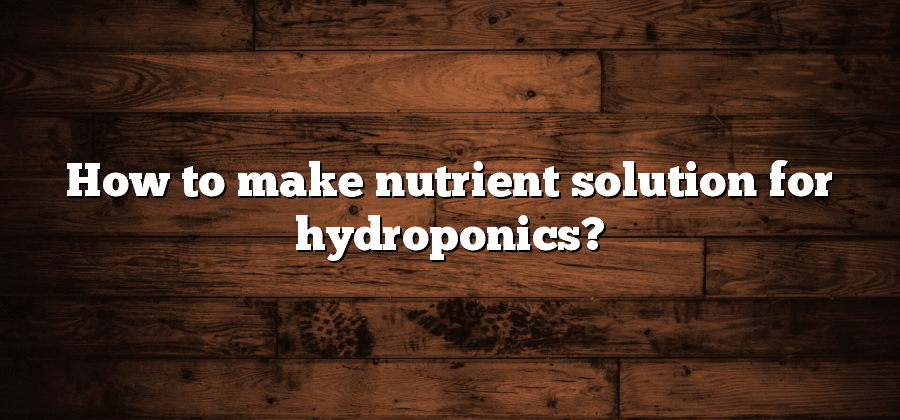Understanding Hydroponic Nutrient Solutions
Hydroponic nutrient solutions are a crucial component of successful hydroponic gardening. Unlike traditional soil-based gardening, hydroponics relies on nutrient-rich water as the sole source of nutrition for plants. By providing a carefully balanced blend of essential elements, hydroponic nutrient solutions ensure optimal plant growth and development.
To understand hydroponic nutrient solutions, it is important to know that they are essentially a mix of minerals and nutrients that are dissolved in water. These solutions are carefully formulated to mimic the natural processes that occur in soil, allowing plants to absorb necessary nutrients for healthy growth. The precise composition of a nutrient solution will vary depending on the specific type of plants being grown, as each plant has unique nutrient requirements. Furthermore, the nutrient solution must be carefully monitored and adjusted throughout the growing process to ensure that plants are receiving an optimal balance of nutrients for maximum productivity.
Essential Components of a Nutrient Solution
When it comes to hydroponics, a nutrient solution is an essential element for plant growth. It provides the necessary minerals, essential elements, and trace elements for plants to thrive in a soil-less environment. There are several key components that make up a nutrient solution, each serving a specific purpose.
First and foremost, the base of the nutrient solution is usually water. It is crucial to use high-quality water that is free from contaminants and has a neutral pH. This ensures that the plants can absorb nutrients effectively. Additionally, the nutrient solution must contain macronutrients such as nitrogen, phosphorus, and potassium. These elements are vital for plant growth and development, playing a significant role in photosynthesis, root development, and fruit formation. Alongside macronutrients, micronutrients such as iron, manganese, and zinc are also necessary in small quantities for optimal plant health and productivity.
Evaluating Nutrient Requirements for Different Plants
When it comes to hydroponic gardening, understanding the nutrient requirements of different plants is crucial for their successful growth and development. Each plant species has unique needs for essential elements like nitrogen, phosphorus, potassium, and various micronutrients. Evaluating these nutrient requirements is a fundamental step in designing an effective hydroponic nutrient solution.
To evaluate the nutrient requirements for different plants, it is important to consider factors such as the growth stage of the plants, their specific nutritional needs, and any specific environmental conditions that may impact nutrient uptake. One way to determine these requirements is by referring to research and literature that provide guidelines for nutrient levels for different crops. These resources often provide recommended ranges for nutrient concentrations, pH levels, and electrical conductivity (EC) values. However, it is important to note that these guidelines serve as starting points, and adjustments may be necessary based on the specific conditions of your hydroponic system and the individual needs of your plants.
Selecting the Right Fertilizers for Hydroponics
Hydroponic systems are a popular choice for modern gardening enthusiasts looking to maximize their plant growth in limited spaces. When it comes to selecting the right fertilizers for hydroponics, there are several factors to consider. First and foremost, it is important to understand that hydroponic plants rely on nutrient solutions rather than soil for their growth. This means that the fertilizers chosen should be specifically formulated for hydroponics, as they provide the necessary nutrients directly to the plants’ roots.
One key aspect to consider when selecting fertilizers for hydroponics is the nutrient composition. Different plants have varying nutrient requirements, and it is essential to find a fertilizer that provides the right balance of macronutrients (such as nitrogen, phosphorus, and potassium) and micronutrients (such as iron, zinc, and manganese). Additionally, considering the growth stage of the plants is crucial, as their nutrient needs may vary during different phases. By carefully examining the nutrient composition of various fertilizers, hydroponic gardeners can ensure that their plants receive the appropriate elements for optimal growth and development.
Calculating Nutrient Concentrations for Hydroponic Systems
Hydroponic systems require precise control over the nutrient concentrations to ensure optimal plant growth and development. Calculating these nutrient concentrations is a crucial step in maintaining a healthy and productive hydroponic system.
To calculate the nutrient concentrations, it is important to have a clear understanding of the nutrient requirements for the specific plants being grown. Different plants have varying nutrient needs, so it is essential to research and evaluate the specific nutrient requirements for each crop. This information can typically be found in scientific literature, research papers, or provided by hydroponic nutrient solution suppliers. Once the nutrient requirements are determined, calculations can be made to achieve the desired nutrient concentrations in the hydroponic solution.






